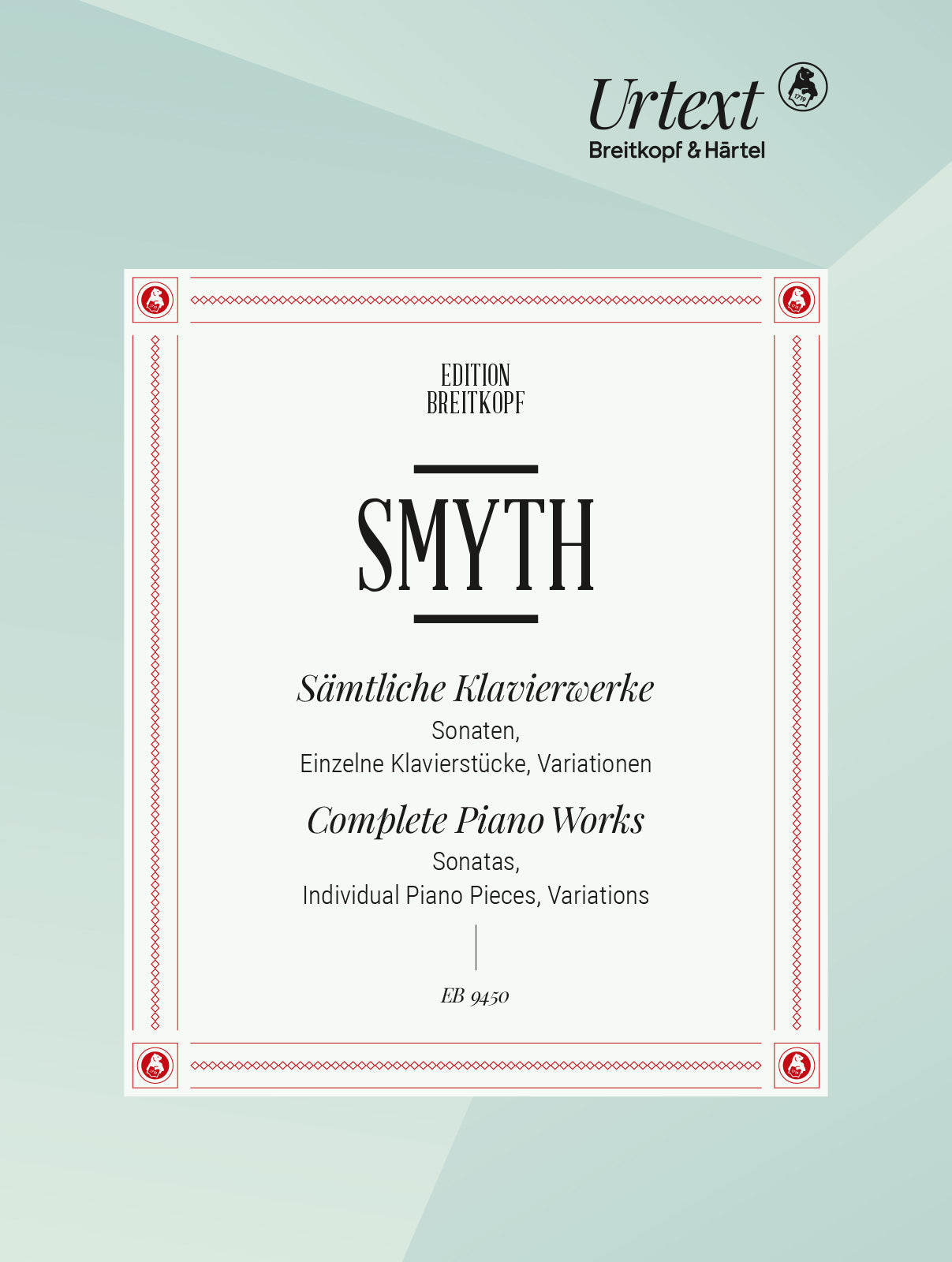Smyth: Complete Piano Works
In stock and typically ships within 1 business day.
- Composer: Ethel Smyth (1858-1944)
- Editor: Liana Gavrila-Serbescu
- Instrumentation: Piano
- ISMN:
- Size: 9.0 x 12.0 inches
- Urtext / Critical Edition
Description
It is quite amazing that the piano works of the English composer Ethel Smyth had remained unpublished until 2003. All of them were written during her Leipzig study years after 1877, a period that Ethel Smyth herself described as the happiest time of her life. in Leipzig, she met such musical giants as Brahms, Clara Schumann, Dvořák, Grieg and Tchaikovsky. It should come as no surprise that these encounters left stylistic traces in Ethel Smyth's piano oeuvre. Smyth wrote the three piano sonatas in 1877, yet they are stylistically diverse: Smyth raced through a kind of musico-historical evolution. Her point of departure was Haydn and Mozart, who clearly inspired her sonata in C Major. It was followed by the impassionate sonata in C-sharp Minor, which was inspired by the actress Marie Geistinger. The two-movement fragment in D Major, reflecting Ethel Smyth's admiration for Brahms, concludes the sonatas. Most of the other piano pieces borrow their atmosphere and titles from Baroque models (dance movements, genre pieces) and are technically undemanding. They have been arranged in this edition in order of progressive difficulty.
Works:
- Piano Sonata No. 1 in C Major (1877)
- Piano Sonata No. 2 in C-sharp Minor (Geistinger) (1877)
- Piano Sonata No. 3 in D Major (1877)
- Piano Piece in E Major
- Aus der Jugenzeit!! (1880)
- Four-part Dances (1880)
- Suite in E Major (Two-part Suite in E) (1880)
- Nocturne (Kanon in Gegenbewegung)
- Kanon in Gegenbewegung mit einer Füllstimme
- Kanon in Gegenbewegung mit Begleitung
- Two-part Invention in D Major (1880)
- Prelude and Fugue in C Major (1884)
- Variations on an Original Theme (of an Exceedingly Dismal Nature) (1878)
- Prelude and Fugue in F-sharp Major (1880)
Publishers use a lot of words to describe what they sell, and we know it can be confusing. We've tried to be as clear as possible to make sure you get exactly what you are looking for. Below are descriptions of the terms that we use to describe the various formats that music often comes in.
Choral Score
A score for vocalists that only contains the vocal lines. The instrumental parts are not there for reference. Generally, cheaper than a vocal score and requires multiple copies for purchase.
Facsimile
Reproductions of the original hand-written scores from the composer.
Full Score
For ensemble music, this indicates that the edition contains all parts on a single system (there are not separate parts for each player). In larger ensembles, this is for the conductor.
Hardcover
Hardbound. Generally either linen-covered or half-leather.
Orchestral Parts
Similar to a wind set, this is a collection of parts. In the case of strings, the numbers listed are the number of copies included, though generally these are available individually (often with minimum quantities required).
Paperback
When publishers offer multiple bindings (e.g. hardcover) or study scores, this is the "standard" version. If you're planning to play the music, this is probably what you want.
Performance / Playing Score
A score of the music containing all parts on one system, intended for players to share. There are not separate parts for each player.
Set of Parts
For ensemble music, this indicates that there are separate individual parts for each player.
Solo Part with Piano Reduction
For solo pieces with orchestra, this is a version that contains a piano reduction of the orchestra parts. For piano pieces, two copies are typically needed for performance.
Study Score
A small (think choral size) copy of the complete score meant for studying, and not playing. They make great add-ons when learning concertos and small chamber works.
Vocal Score
A score prepared for vocalists that includes the piano/organ part or a reduction of the instrumental parts.
Wind Set
For orchestral music, this is a collection of wind and percussion parts. The specific quantities of each instrument are notated.
With Audio
In addition to the printed music, the edition contains recordings of the pieces. This may be an included CD, or access to files on the internet.
With / Without Fingering (Markings)
Some publishers prepare two copies - a pure Urtext edition that includes no fingering (or bowing) suggestions and a lightly edited version that includes a minimal number of editorial markings.


